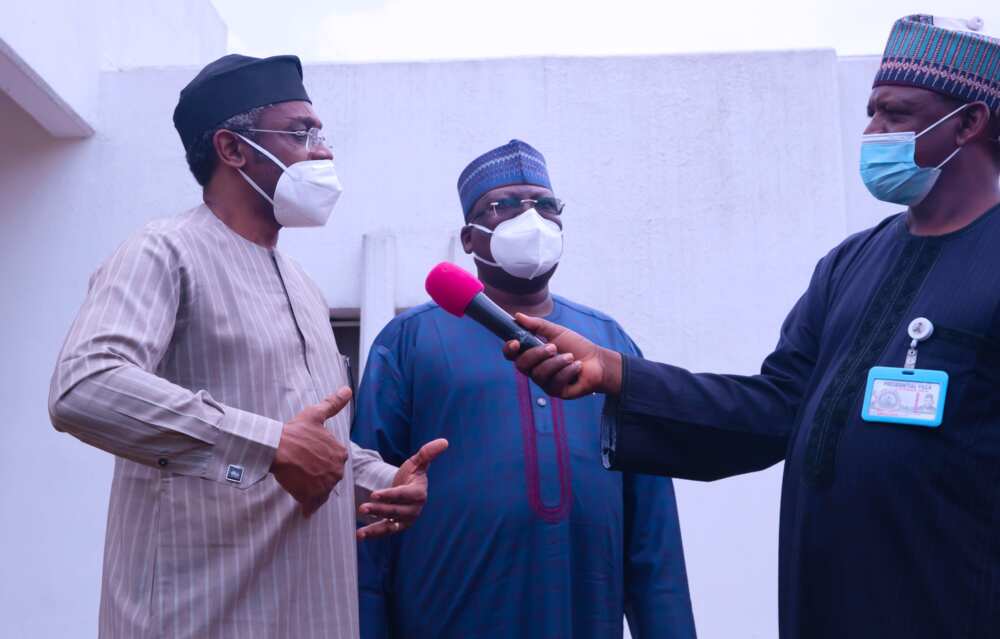Analysing Nigeria’s Dangerous Road to Infectious Disease Legislations
There is a common quote in governance that sums up the importance of checks and balances and cautions against setting a dangerous precedence.
PAY ATTENTION: Сheck out news that is picked exactly for YOU ➡️ find the “Recommended for you” block on the home page and enjoy!
To paraphrase it, it is advised that people should not hand over excessive power to the president or leader that they love and admire lest that same power will fall into the hands of a tyrannical leader and it will be used against them.

Source: Facebook
The Public Health Emergency Bill and Control of Infectious Diseases Bill which are in the Senate and House of Representatives respectively despite their necessary importance in providing a legal framework for managing the response to COVID-19 pandemic and infectious diseases might inadvertently create monsters if passed into laws.
To understand this is to understand where Nigeria is coming from in respect to managing diseases and why the bills became necessary and how they should not be used as Trojan horses.
Background
The first confirmed COVID-19 case was detected in Wuhan, China although then it was referred to as SARS COV 2 and later coronavirus. Since then, it has spread across the world with only a handful of countries with reported zero cases.
There have been more than 219 million confirmed cases globally with 4.5 million confirmed deaths. The first case of COVID-19 in Nigeria was reported on the 27th of February, 2020 when an Italian citizen tested positive. The country has recorded more than 208,000 cases and close to 3,000 deaths.
In response to the growing number of cases, authorities in Nigeria's most populated city, Lagos, announced that public gatherings should be reduced. President Muhammadu Buhari announced on March 30, 2020, that Lagos, Ogun, and the Federal Capital Territory would be going into a two-week lockdown to mitigate the spread of the virus. International travel was closed down while inter-state travels were also restricted.to essential travels. The lockdown was ultimately extended by another two weeks.
Despite the seemingly good intention of the lockdown, it was criticised in some quarters, and rightfully so. COVID-19 is not the first infectious disease Nigeria had dealt with in the last decade. In 2014, Nigeria had to deal with the Ebola outbreak. Thanks to the quick-thinking effort of Dr. Ameyo Adadevoh, the spread was mitigated and Nigeria was ultimately declared Ebola-free with relatively few casualties. In that situation, there was no need for a lock-down or an imposition of rules to prevent the movement of people.
The criticism that greeted President Buhari’s lockdown imposition was due to its perceived illegality. The president had to rely on the Quarantine Act of 1926 which was considered inadequate by many. Nobel laureate, Professor Wole Soyinka wrote an article asking those with the right knowledge to examine the president’s directive.
Human rights activist and respected lawyer, Femi Falana, SAN said:
“No doubt, the president is empowered to adopt any measures deemed fit to combat the dangerous disease but such measures have to be spelled out in a regulation made according to section 305 of the Constitution or under the Quarantine Act. Otherwise, the presidential order on the restriction of movement in the affected areas cannot be enforced by the police.”
The Quarantine Act which the president relied on was a colonial enactment which due to modern development and changes has remained inadequate in addressing current needs. This became one of the reasons for the push for new laws to replace the Quarantine Act.
Legislation
A Bill for an Act to repeal the Quarantine Act and enact the Control of Infectious Diseases Act was presented by the Speaker of the House of Representatives, Honourable Femi Gbajabiamilawhile a similar one titled The National Health Emergency Bill was presented at the Senate.
According to the Speaker, the bill is meant to strengthen the Nigerian Centre for Disease Control (NCDC) and make it more proactive. On paper, the bill is meant to provide a legal framework and legislative backing for whatever action will be taken to address and manage viral diseases.
An exhaustive examination of the bill however raises serious concern about the fundamental human rights of Nigerians, the seemingly authoritative power placed in the hands of the director-general of the NCDC rather than the institution, and the creation of a system that might be misused by dictators wearing the garb of democrats.
In the spirit of true democracy, Nigeria does not need strong men but strong institutions. While some leaders would distinguish themselves regardless of institutions, it is important to strengthen institutions so that they serve as a framework to guide leaders and also check their excesses.
The bill presented in the House of Representatives when critically analysed places immense power in the hands of the Director-General (DG) of the NCDC and the president rather than the institution. At a cursory look, the director-general was mentioned 144 times in the bill while the NCDC was comparatively mentioned 18 times.
The power vested in the hands of the director-general despite being as good-natured as it may look creates a problem where the leader rather than the centre is allowed to make critical decisions.
For example, part 1 of the act gives the NCDC DG the authority to appoint a public officer; an officer of any statutory body or employee of a prescribed institution, to be a Health Officer and “delegate to any Health Officer all or any of the powers conferred on him.”

Read also
Real reason fuel scarcity resurfaced in Lagos, other cities as NUPENG protests police extortion, others
This means the NCDC DG on his own can make critical appointments without necessarily consulting the institution.
Healthcare professionals are required to provide information to the director-general according to the bill
“notwithstanding any restriction on the disclosure of information imposed by any written law, rule of law, rule of professional conduct or contract.”
This gives a blanket opportunity for the violation of doctor-patient confidentiality. Another worrying area of the bill is the power of ‘enforcement officers’ to arrest anyone on the street suspected to be infected with a viral disease or the destruction of a building or anything believed to be contaminated.
Section 24 of the bill says that:
“Every enforcement officer, police officer or any authorized officer may apprehend and take, any person suffering from any infectious disease whom the officer finds on any street, public place, shop or public transportation to a hospital.”
This means that a police officer on the street who is not trained in the medical field or has prior medical knowledge can on the basis of his own examination diagnose and pronounce someone on the street infected with a viral infection and then proceed to arrest the person. The bill also provides enforcement officers the liberty to destroy a building where an infected person may have occupied.
The bill also gives the president unbridled authority to declare an area in Nigeria a restricted zone for the sake of public health and restrict entry and exit from those places. While this may seem like it is for a good motive, the unilateral way this can be done raises concern about the right to free movement.
The National Health Emergency Bill 2020 also places exclusive power in the hands of the NCDC DG while giving little responsibility to the institution. It also does not put states into consideration and instead makes blanket recommendations for the entire country. State governments' input in a federal system is very significant as they are closer to the people.
Recommendation
There is no doubt that there is a need for the obsolete Quarantine Act to be repealed and replaced. It is pertinent however not to create a monster in its stead. The Human Rights Measurement Initiatives rank Nigeria as poor and also place the country as below average in Sub-Saharan Africa.
There have been numerous reports of human rights abuse in Nigeria and having a legislative framework that can be used to perpetuate this abuse is dangerous.
For example, Susan Okpe, a British returnee who was detained for more than 40 days claimed she was given a false COVID-19 result that contained wrong personal information about herself. She claimed she was detained and taken from Benue state to Abuja while her name was announced as the index COVID-19 case in Benue state despite no evidence to prove it.
With a new law that gives blanket authority to the NCDC DG, enforcement officers, and police officers to act without being checked, there is the risk of abuse of the rights of Nigerians.
The bill should be amended to reduce the power given to the director-general of the NCDC, enforcement officer, and the police and instead vest it in the institution. Also, the right to arrest and detain anyone on the basis of infection should be removed and replaced with a medically recommended option. Also, the ability to destroy buildings or anything as contained in the bill should be re-examined and should conform to existing laws. This is because the destruction of a building cannot be fixed if ultimately it is realised that it was done in error.
Importantly, the bill should be subjected to further consultation from medical experts, human rights groups, and civil society organisations like Yiaga Africa, a non-profit civic hub of change-makers promoting democratic governance, human rights, and civic engagement. This will be in the best interest of Nigerians so that the effort to tackle and mitigate the spread of infectious diseases will be done with the guaranteed protection of the rights and lives of the citizens.
Source: Legit.ng






